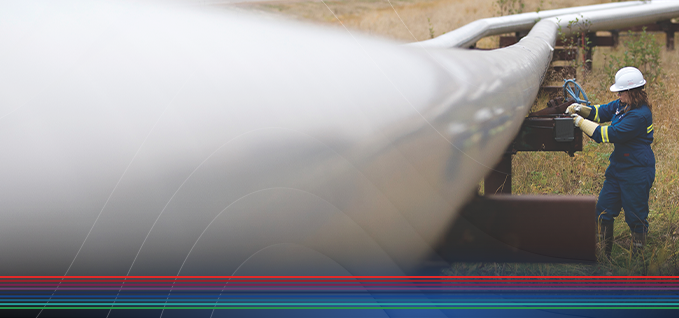ExxonMobil Pipeline Company’s Integrity Management Program (IMP) utilizes state-of-the-art methods to assess the integrity of all our pipeline systems.
 Inline inspections (ILI)
Inline inspections (ILI)
Most assessments are performed with inline inspection tools known as "smart pigs." These tools are capable of detecting anomalous conditions associated with the pipeline. Use of this technology allows ExxonMobil Pipeline Company to proactively address possible integrity issues in its systems before safety and environmental performance is compromised.
ExxonMobil Pipeline Company employs industry-leading technologies to conduct its inline inspections through qualified, expert vendors. During an ILI, third-party experts insert a smart pig that is configured with a combination of sensors to gather multiple measurements as it moves through the pipeline, propelled by the flow of oil or product. There are many types of smart pigs, each designed to assess various characteristics of the pipeline.
 Hydrostatic pressure tests
Hydrostatic pressure tests
Hydrostatic pressure tests, or hydrotests, use pressurized water to identify areas of a pipeline that may need repair. They are generally conducted when a pipeline is being put into service for the first time, being brought back into service after a prolonged period, or as part of a periodic integrity assessment.
Prior to a hydrotest, the product is displaced from the pipeline section being tested and replaced with non-potable water in order to minimize potential environmental damage that might result from leaks or ruptures during the test. The pipeline section is filled with enough water to create significantly more pressure inside the pipeline than is created during normal operations. If the pipeline holds the elevated pressure for a predetermined amount of time, the pipeline is determined to be fit-for-service.
Inline inspection is typically preferable to a hydrotest because it provides more data about the pipeline’s integrity, can be conducted while the pipeline is in service, and does not stress the pipeline beyond its normal operating conditions.
 Direct assessment
Direct assessment
Direct assessments are conducted in cases where it is impractical to conduct a hydrotest or an ILI. This type of test requires excavating the soil from around the pipeline in representative places to directly evaluate the condition of the pipeline.
